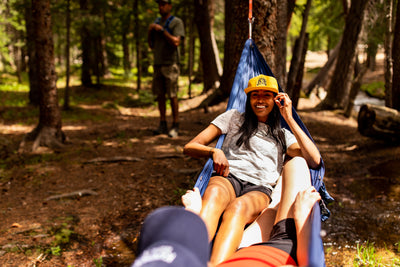Camping at Home with Everyday Adventure Fam
Written by Dr. Felicia Wong.
Dr. Felicia Wong is a physician, outdoor enthusiast, and wellness blogger based in Southern California. Between her and her husband (also a physician)'s busy work schedules, raising two young sons, and running her popular Instagram account Everyday Adventure Fam and blog on adventure tips, she exemplifies what it means to live intentionally and joyfully with her family. The Wong family can be found hiking, biking, enjoying a day at the beach, or skiing in the nearby mountains on any given weekend. However, one of their favorite activities is camping. In this blog post, Dr. Felicia Wong shares ideas to help you celebrate National Camp At Home Day!
Our family loves to camp - at home, close to home, in state and national parks, or off grid. We started glamping as a family 6 years ago, and have gradually worked our way from glamping to car camping, to boondocking and backpacking!
One of my favorite things to do, aside from planning our own camping trips, is to encourage more people to give camping a try. National Camp at Home Day - March 27 - is a great time for new campers to do a practice run, and for seasoned campers to test out and inventory gear in preparation for the spring/ summer camping season! To help you get ready for this fun weekend, we have come up with some ways to enhance your camp at home experience:
Turn off your electronics and set them aside. Consider turning off your wifi. Unplug.
If weather and space permits, consider camping outdoors on your patio or in your yard. If you have one, get cozy around an outdoor firepit with some camp blankets!
If camping inside, you can create a nice camp ambience by moving some houseplants around your tent. If you have a fireplace, set up your Swiftlet hammock stand and hammock nearby.
Play “camp games” . Our kids love card games like War and Go Fish!
When it gets dark out, turn off the lights and use your camp lanterns, flashlights, headlamps.
Treat yourself to classic camp treats like s’mores and hot chocolate with mini marshmallows
No campfire at home… No worries! Here are 3 methods to make S’mores at home!
S’mores on the Stovetop:
If you have a gas stovetop, you can roast marshmallows just as you would over a campfire. Put a marshmallow on a skewer and set the stovetop burner on low heat. Use care while slowly turning the marshmallow over the heat to your desired doneness. We recommend this method for adults, as it involves an open flame.
S’mores in the Oven:
Start by preheating the oven to 400 degrees F. Break the graham crackers into halves, and place half of them on a baking sheet. Top each graham cracker with chocolate, and then a marshmallow. Bake until the marshmallows are puffed and golden brown, about 3 to 5 minutes. Top with the remaining graham cracker halves and press to flatten. If you prefer your marshmallows extra toasty, you can also use the broiler following the same steps, but will need to watch them very closely, because they can burn quickly. Serve immediately while the S’mores are still warm!
S’mores in the microwave:
Place chocolate and marshmallows on up to four graham cracker halves and put on a microwave-safe plate. Microwave on high for 15 to 20 seconds, or until the marshmallows puff. Top with the remaining graham cracker halves.
Learn more about how to participate in this year's National Camp at Home Day here.
Happy camping!



















